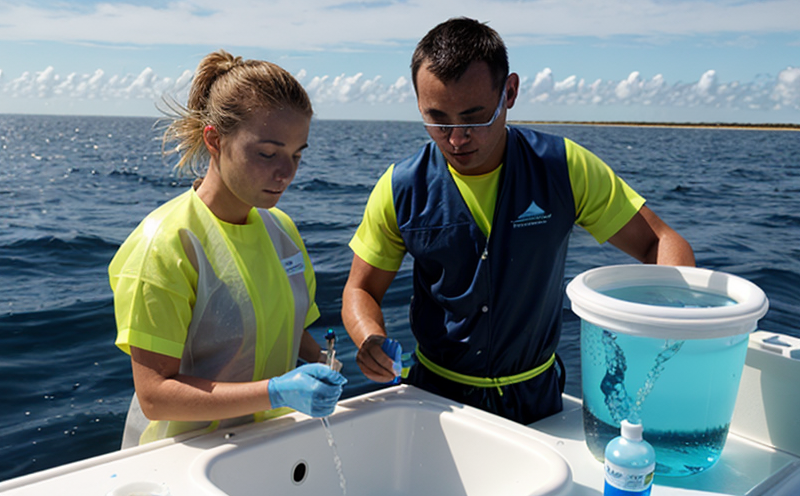ASTM D516 Sulfate Test in Seawater
The ASTM D516 sulfate test is a critical analytical procedure used to determine the total dissolved sulfate content in seawater. This test is essential for understanding water quality and ensuring compliance with environmental regulations, particularly in areas where industrial discharges or natural processes contribute significant amounts of sulfate. The test is widely recognized and utilized by industries such as pharmaceuticals, food & beverage, and wastewater treatment facilities.
The ASTM D516 procedure involves the titration method using barium chloride to precipitate barium sulfate from the seawater sample. This process requires precise handling and measurement techniques to ensure accurate results. The test is not only relevant for environmental monitoring but also plays a crucial role in assessing the impact of industrial activities on marine ecosystems.
Understanding the sulfate content in seawater is vital for several reasons:
- Environmental Impact Assessment: High sulfate levels can indicate pollution from industrial discharges or natural sources like volcanic activity. Monitoring sulfate levels helps in identifying areas that need intervention to protect marine life and aquatic ecosystems.
- Water Quality Compliance: Many regions have regulatory limits on sulfate content in seawater. This test ensures compliance with local, national, and international standards such as ISO 17025 for laboratory accreditation.
- Treatment Efficiency Monitoring: In wastewater treatment plants, the ASTM D516 sulfate test helps monitor the effectiveness of desulfurization processes, ensuring that effluent discharges meet environmental quality guidelines.
- Pharmaceutical Industry: Sulfate content in seawater is a key parameter affecting drug formulations and purity. The test ensures consistent product quality by providing accurate sulfate levels.
- Food & Beverage Sector: High sulfate concentrations can influence the taste and quality of products derived from seawater, making this test essential for maintaining product standards.
The ASTM D516 sulfate test is a fundamental tool in the water & wastewater testing sector. It provides critical insights into environmental health, industrial impact assessment, and compliance with regulatory frameworks. By accurately measuring sulfate content, laboratories can support decision-making processes that protect ecosystems and ensure quality products.
Benefits
- Enhanced Environmental Compliance: By accurately measuring sulfate content, laboratories can ensure that industrial discharges and effluents meet regulatory standards.
- Improved Water Quality Monitoring: Regular testing helps in identifying potential pollution sources and taking corrective actions promptly.
- Sustainable Industrial Operations: Continuous monitoring of sulfate levels supports sustainable practices by optimizing treatment processes and reducing environmental impact.
- Product Quality Assurance: In industries like pharmaceuticals and food & beverage, accurate sulfate measurements ensure consistent product quality and safety.
- Cost Savings: Early identification of pollution sources through ASTM D516 testing can prevent costly legal disputes and penalties.
- Enhanced Reputation: Demonstrating adherence to rigorous environmental standards enhances a company's reputation among stakeholders, including customers, regulators, and the public.
Quality and Reliability Assurance
The ASTM D516 sulfate test is performed in accordance with internationally recognized standards such as ISO 17025. Our laboratory adheres to strict quality control procedures to ensure accurate and reliable results every time. We employ experienced technicians who are trained in the latest techniques and use state-of-the-art equipment to conduct these tests.
Our commitment to quality is further reinforced by our participation in proficiency testing programs, which validate our analytical capabilities against industry benchmarks. This ensures that our sulfate test results are trusted and accepted globally. Whether you need one-off tests or ongoing monitoring, we provide consistent and reliable data that can be used for decision-making processes.
International Acceptance and Recognition
The ASTM D516 sulfate test is widely recognized and accepted across the globe due to its robust methodology and consistency with international standards. Many countries incorporate this test into their environmental regulations, ensuring that results are universally comparable. Our laboratory's expertise in conducting ASTM D516 tests ensures that you receive results that align with global expectations.
By leveraging our services, you can ensure that your sulfate measurements meet the highest international standards, thereby enhancing your compliance efforts and supporting sustainable practices worldwide. Whether for regulatory reporting or internal quality control, we provide the precision and reliability needed to succeed in today's competitive market.





